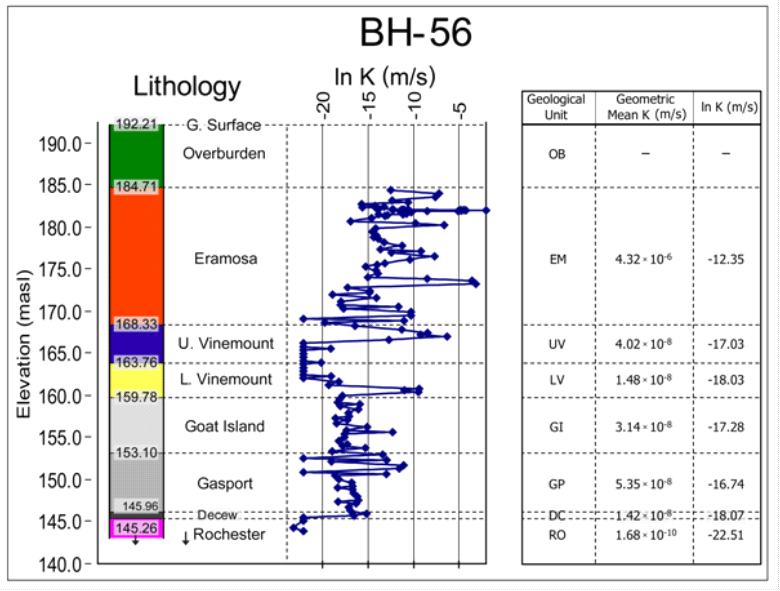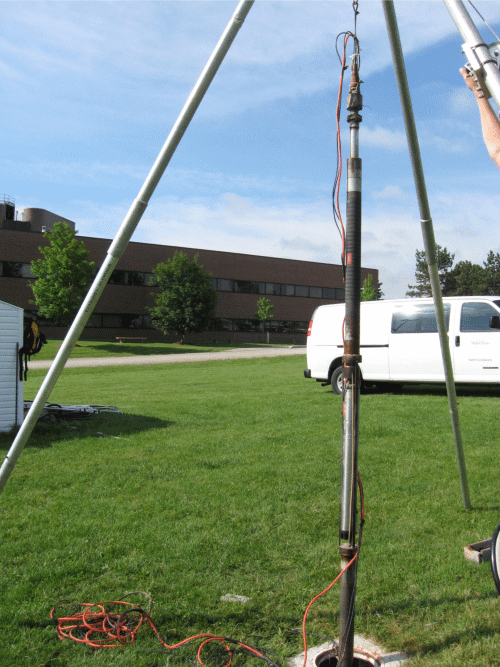
Emerging Techniques in Hydraulic Testing for Fractured Rock:
Analysis of Single-Hole Hydraulic Testing
in Fractured Rock and Its Implications

Packer testing, slug testing, and other single-hole hydraulic tests are often used in the same way although geologic conditions warrant unique design and analysis considerations.
Despite the success of single-hole hydraulic testing for obtaining reliable hydraulic conductivity values, these tests have limitations related to scale, heterogeneity, and correlation to fracture density.
Register now and learn ways to stretch your dollars by making efficient design decisions, selecting the appropriate analysis strategy and avoid re-work or needless uncertainty.
Recognizing When Porous Media Assumptions are Invalid
Assumptions of homogeneous porous media aquifers are often applied to fractured rock, even in sparsely fractured bedrock. While it is perfectly acceptable to adopt homogenous porous media assumptions in some situations; more often than not, these concepts and assumptions lead to erroneous results. Learn to recognize the threshold when homogeneous porous media assumptions end and heterogeneity in fractured rock systems need to be considered.

Background
Fractured rocks are highly heterogeneous and its accurate characterization is difficult. Laboratory methods of site characterization typically cannot be utilized to obtain reliable hydraulic parameters. Instead, single-hole hydraulic tests can be utilized to rapidly obtain estimates of hydraulic conductivity and specific storage along boreholes which provides information on how these parameters vary at a site.

Results of hydraulic conductivity estimated from multiple single-hole tests
conducted at a field site in Ontario, Canada.
Webinar Topics
Dr. Illman will teach how to obtain hydraulic parameters such as hydraulic conductivity and specific storage, but the latter with more difficulty from single-hole tests. The resulting information gained from such tests can be utilized to assess the degree of heterogeneity at a site and used to plan additional site characterization activities.
Different types of single-hole tests are reviewed for their strengths and weaknesses. We will review the solutions to analyze single-hole tests with emphasis on assumptions to enable participants better understand the right interpretation method to use for their analyses.
Webinar Highlights
- Introduction to packer testing, slug testing and the concept of single-hole hydraulic testing.
- Review traditional interpretation methods for single hole hydraulic testing.
- Review the test assumptions for selecting the appropriate analysis strategy.
- Discuss the reliability of estimated hydraulic conductivity and specific storage values.
- Recognize the relationship between single-hole tests to depth, lithological data, and fracture geometry data.

Tripod set up before field testing.
| Fee: |
$119.00 USD each
when you register for the Entire Series

Per Computer Site (unlimited participants per site)
$299.00 USD for this webinar
Per Computer Site (unlimited participants per site)
|
| Instructor: |
Walter Illman, PhD |
|
| Handouts: |
Copy of Webinar Slides (pdf)
Record of Attendance Form (pdf)
|
| Duration: |
1.5 hour plus Q&A
(no restrictions on time limit for extra Q&A!)
|
Professional
Development: |
Earn 1.5 Professional Development Hours (1.5 PDH)
 |
SCHEDULING CONFLICT?
here's an option for you
A Record of Attendance Form is included free with each webinar for your record keeping and individual PDH verification. We ask your on-site coordinator to return the completed and signed copy of the Form to us following the webinar for (1) maintaining a separate copy as a service to attendees and (2) forwarding to NIU confirming attendance for those who order certificates.
Attendees may also order an official a Course Completion Certificate from Northern Illinois University for a small administrative fee. The Certificate is optional and may be ordered separately following the webinar to confirm your attendance and showcase the certificate on your office wall. Instructions for ordering certificates are given during the webinar.

* This webinar is eligible for the 'BUY THREE, GET THREE' discount; however ANY webinar series discount shown above cannot be combined with it.
Attendees will be invited to actively participate during this live and interactive on-line web seminar. Discussion is planned following the webinar for those who want to continue the session. Bring your questions to the webinar and present them to the instructor and other participants for exploring the best solution.
Instructor Bio
 Professor Illman has over 20 years of academic and consulting experience in a wide range of hydrogeological problems worldwide, particularly in developing high-resolution site characterization techniques, applying advanced groundwater flow and transport models, and developing innovative laboratory and field methods to solve complex environmental problems. His current research interests include field investigations of subsurface heterogeneity in both porous and fractured geologic media, in particular the innovative interpretation of single- and cross-hole hydraulic tests. He is considered one of the pioneers in developing hydraulic tomography, a new subsurface characterization method to image heterogeneities of hydraulic conductivity and specific storage. He has applied hydraulic tomography and related techniques in a variety of geological environments including highly heterogeneous porous and fractured media. Professor Illman is the author of over 60 publications in peer-reviewed journals and has served as an Associate Editor for Water Resources Research and Groundwater. Other notable published work includes a book on Bioremediation and Natural Attenuation: Process Fundamentals and Mathematical Models, published by John Wiley & Sons, Inc. of which he is a coauthor.
Professor Illman has over 20 years of academic and consulting experience in a wide range of hydrogeological problems worldwide, particularly in developing high-resolution site characterization techniques, applying advanced groundwater flow and transport models, and developing innovative laboratory and field methods to solve complex environmental problems. His current research interests include field investigations of subsurface heterogeneity in both porous and fractured geologic media, in particular the innovative interpretation of single- and cross-hole hydraulic tests. He is considered one of the pioneers in developing hydraulic tomography, a new subsurface characterization method to image heterogeneities of hydraulic conductivity and specific storage. He has applied hydraulic tomography and related techniques in a variety of geological environments including highly heterogeneous porous and fractured media. Professor Illman is the author of over 60 publications in peer-reviewed journals and has served as an Associate Editor for Water Resources Research and Groundwater. Other notable published work includes a book on Bioremediation and Natural Attenuation: Process Fundamentals and Mathematical Models, published by John Wiley & Sons, Inc. of which he is a coauthor.